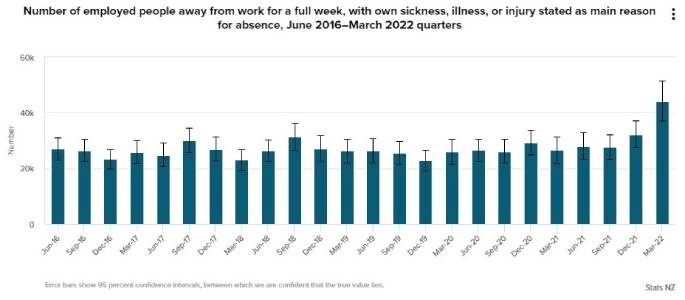The number of people off sick for more than a week almost doubled in the three months to the end of June, according to Stats NZ.
About 55,000 people cited illness as the reason for being off work for a week during the last quarter, following a similar trend reported for the March quarter.
Food manufacturing and packaging plant Hansells Masterton was operating at 80 per cent capacity and running behind on some orders due to staff absences, says chairperson Alan Stewart.
'We have all the time people away either from Covid or from the flu. In the factory we've got lines that can't operate because we've got people away.”
While the Government doubled the minimum statutory sick leave from five days to 10 during 2020, many staff had already used it all of their leave, Stewart says.
Where people have completely run out, the company works with them on other options including using holiday leave or taking unpaid time off.
The situation is 'dire and depressing,” says Matt McLaughlin of Hoff Hospitality.
A business owner for 20 years, McLaughlin says the unprecedented staff shortage is being compounded by sickness among the staff they still have.
Across his three Wellington venues, McLaughlin says one kitchen is 'closed completely” while two others are operating on reduced hours, which has cost hundreds of thousands of dollars in lost revenue.
This is partly to avoid putting too much pressure on the staff to prevent people leaving the industry entirely, he says. Alternative leave options are worked out on a 'case-by-case basis”.
Hospitality NZ board member Jeremy Smith says restaurateurs are performing a juggling act between looking after staff and being able to pay them.
Employers are working with employees to find the best solution as they didn't want to risk losing more staff.
Smith says most businesses are using a combination of annual leave and negative leave, acting on the understanding that employees will remain with them for a while and could earn the sick leave in the future.
 There were more people away from work due to sickness last quarter - Stats NZ finds.
There were more people away from work due to sickness last quarter - Stats NZ finds.
The problems are not confined to the hospitality industry, although customer-facing sectors have been hit hard because of the requirement for workers to be on site.
Small to medium businesses were being hit the hardest and especially prone to instability from Covid, says Blair Scotland, a partner at Dundas Street Employment Lawyers.
Even with no money coming in, businesses still have outgoings and, for some, having to pay double the sick leave now put them under added strain.
Once the sick leave is up, employees will have to use holiday pay or take unpaid leave, he says.
Larger companies, however, had the 'luxury” of more staff cover, more money to enable offering more than the minimum entitlement.
ANZ doesn't have a set number of days entitlement, meaning they can accommodate situations where staff need more sick leave than usual, says general manager for talent and culture Michelle Russell.
It's a 'managed” rather than 'unlimited” sick leave policy, as ANZ reserved the right to limit it, she says.
Public Service Association assistant secretary Alex Davies says many union members have more than the 10-day minimum sick leave and can request discretionary leave if this ran out.
However, some employers had taken an 'unduly punitive approach” to sick leave during Covid, he says, adding this was poor practice and undermined the public health effort.
'The PSA supports taking a flexible and supportive approach to ensure that workers, and the public health, comes first.”
Minister for Workplace Relations and Safety Michael Wood says the current situation highlights the importance of doubling minimum sick leave to ensure people have adequate sick leave and financial support in place where people need to stay home.
He says he thinks the Government has the right balance with the Covid-19 leave support scheme, adding he hadn't heard strong calls from employers or unions about the scheme.
Earlier this week, Covid-19 Response Minister Ayesha Verrall confirmed New Zealand would stay at the orange traffic light setting, adding there would be no changes to case isolation and household contact quarantine requirements which will be reviewed next month.



0 comments
Leave a Comment
You must be logged in to make a comment.